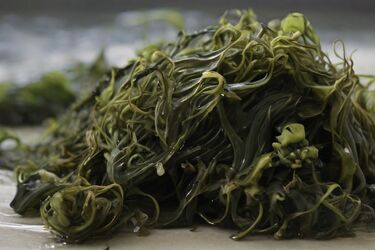Who needs to use seaweed with caution

BLOG
Seafood has traditionally been considered an important component of the healthiest diets, including the Mediterranean and Japanese diets. Discussions of their benefits are more often focused on fish and seafood. However, it is worth discussing the peculiarities of plant-based seafood as well, as they have been very popular among Ukrainians for a long time.
Seaweed is a source of nutrients for living things in the ocean. These plants grow along rocky shores around the world. They are most commonly eaten in Asian countries such as Japan, Korea, and China. Seaweed is extremely versatile and can be used in many dishes, from soups and stews to salads, sushi and smoothies.
Seaweed contains a wide range of substances important for our body, and its benefits are scientifically proven.
SUPPORT FOR THYROID FUNCTION
Everyone knows that thyroid hormones are constantly needed for the normal functioning of almost all organs and systems of the body. The gland itself, in turn, needs an intake of a trace element called iodine. Without a sufficient amount of it, over time, manifestations of decreased thyroid function occur: unstable weight, fluctuations in blood pressure, fatigue, edema, and an increase in the size of the gland (goiter). The recommended daily intake of iodine for adults is 150 mcg per day.
Seaweed has a unique ability to absorb concentrated amounts of iodine from the ocean. The iodine content differs depending on the species, place of growth, and processing method. For example, one sheet of dried seaweed can contain 11-1989% of the daily iodine requirement.
In nori seaweed, the iodine content is 37 mcg per gram (25% of the daily value), in wakame - 139 mcg per gram (93%), in kombu - 2523 mcg per gram (1682%). One of the best sources of iodine is kelp. Just one teaspoon (3.5 grams) of dried kelp contains 59 times the daily requirement of iodine.
Seaweed also contains the amino acid tyrosine, which, together with iodine, is used to produce two key hormones that help the thyroid gland to do its job properly.
A SOURCE OF VITAMINS AND MINERALS
Each type of algae has a unique set of nutrients. Adding them to food not only accentuates the taste and flavor, but also increases the intake of vitamins and minerals.
Only one tablespoon (7 grams) of dried spirulina provides 20 calories, 1.7 grams of carbohydrates, 4 grams of protein, 0.5 grams of fat, 0.3 grams of fiber, 20% of the daily value of riboflavin, 14% of thiamine, 11% of iron, 6% of manganese, and 47% of copper.
Seaweed contains small amounts of vitamins A, C, E and K, as well as folic acid, zinc, sodium, calcium and magnesium. And the proteins present in some seaweeds, such as spirulina and chlorella, have all the essential amino acids.
Dried green and purple algae contain significant amounts of vitamin B12. One study found that 2.4 mcg, or 100% of the daily value of vitamin B12, is found in just 4 grams of nori algae. However, there is ongoing debate whether the body is able to properly absorb vitamin B12 from seaweed.
CONTAIN PROTECTIVE ANTIOXIDANTS
Antioxidants can make unstable substances in the body called free radicals less reactive. This reduces the likelihood that they will damage cells.
Excessive formation of free radicals is thought to be a major cause of several diseases, including cardiovascular disease and diabetes.
In addition to antioxidant vitamins A, C and E, seaweed boasts a wide range of beneficial plant compounds, including flavonoids and carotenoids. They have also been shown to create a strong defense of the body's cells against free radical damage.
Many studies have focused on a specific carotenoid called fucoxanthin. It is found in brown algae, such as wakame, and has 13.5 times the antioxidant capacity of vitamin E. Fucoxanthin has been shown to protect cell membranes better than vitamin A. Although the body does not always absorb fucoxanthin well, absorption can be improved by eating it with fat.
PROMOTE INTESTINAL HEALTH
Seaweed is an excellent source of fiber, which makes up approximately 25-75% of its dry weight. This is higher than the fiber content of most fruits and vegetables. Fiber improves digestion and is a source of nutrients and energy for the "friendly" bacteria in the large intestine.
Sulfated polysaccharides found in seaweed have been found to accelerate the growth of "friendly" intestinal bacteria. They can also increase the production of short-chain fatty acids, which provide support and nutrition for intestinal epithelial cells.
HELP TO LOSE WEIGHT
The fiber in seaweed is calorie-free and can slow the emptying of the stomach. This contributes to a longer feeling of satiety and delays the return of hunger.
Seaweed is also believed to have an anti-obesity effect. In particular, several animal studies show that fucoxanthin in seaweed helps reduce body fat. In one experiment on rats, this substance increased the expression of a protein that metabolizes fat. In another, it significantly reduced blood sugar levels, which further contributed to weight loss. Although the results are quite promising, it is important to verify these findings in human studies.
REDUCE THE RISK OF HEART DISEASE
Heart disease is the leading cause of death worldwide. Among the factors that increase the risk are high cholesterol, high blood pressure, smoking, lack of physical activity, or being overweight.
Seaweed can help lower blood cholesterol levels. In one 8-week study, rats with high cholesterol were fed high-fat foods with 10% lyophilized algae added. Scientists found that the rats had a 40% reduction in total cholesterol, a 36% reduction in LDL cholesterol, and a 31% reduction in triglycerides.
Heart disease can also be caused by excessive blood clotting. One animal study has shown that fucans extracted from seaweed prevent blood clotting as effectively as an anti-clotting drug.
Scientists are also beginning to study peptides in seaweed. Initial experiments on animals have shown that these protein-like structures can prevent the mechanisms of high blood pressure in the body. However, large-scale studies involving humans are needed to confirm these results.
REDUCE THE RISK OF TYPE 2 DIABETES
Diabetes is caused by impaired metabolism and blood sugar control. By 2040, 642 million people worldwide are expected to have type 1 or type 2 diabetes.
Interestingly, seaweed has become a central research topic for new ways to support people at risk of diabetes. The results of an 8-week study involving 60 Japanese people demonstrated that fucoxanthin, a substance in brown seaweed, can help improve blood sugar control. Participants received topical seaweed oil containing 0 mg, 1 mg, or 2 mg of fucoxanthin. According to the results of the study, those who received 2 mg of fucoxanthin had improved blood sugar levels compared to the group that did not. The study also noted additional improvements in blood sugar levels in those with a genetic predisposition to insulin resistance, which is the main mechanism for the development of type 2 diabetes.
Another substance in seaweed, alginate, prevented blood sugar spikes in animals after they were fed a high-sugar diet. It is thought that alginate may reduce the absorption of sugar into the bloodstream.
POSSIBLE HAZARDS
Even though seaweed is considered a healthy food, excessive consumption can be potentially dangerous.
EXCESSIVE IODINE
The high consumption of seaweed by the Japanese may be one of the reasons for the highest life expectancy in the world. However, the average daily intake of iodine in Japan is estimated at 1000-3000 mcg (667-2000% of the daily requirement). At the same time, 1100 mcg of iodine is the permissible upper limit for adults. Fortunately, in Asian cultures, seaweed is usually eaten together with substances that prevent the absorption of iodine by the thyroid gland (goitrogens or zobogens). They are found in broccoli, cabbage, and bok choy.
In addition, seaweed dissolves in water, which means that its preparation and processing affects its iodine content. For example, if kelp is boiled for 15 minutes, it can lose up to 99% of its iodine content.
There have been cases linking the consumption of iodine-containing kelp to thyroid dysfunction, but the gland function returned to normal after consumption was stopped. The symptoms of iodine excess are often the same as those of iodine deficiency: unstable blood pressure and heart disease, goiter, edema, weight fluctuations, etc. If you experience such symptoms, you should reduce your intake of iodine-rich foods and consult a doctor.
ACCUMULATION OF HEAVY METALS
Seaweed can absorb and store minerals in concentrated amounts. This poses a health risk, as seaweed can contain large amounts of toxic heavy metals such as cadmium, mercury, and lead.
In most countries, the content of heavy metals in seaweed is usually below the maximum allowable concentration.
A recent study analyzed the concentration of 20 metals in 8 different seaweeds from Asia and Europe. It was found that the content of cadmium, aluminum, and lead in 4 grams of seaweed does not pose a serious health risk.
With regular consumption of seaweed, such a possible danger still exists. Whenever possible, choose organic seaweed, which generally contains less heavy metals.
Seaweed is becoming a popular ingredient around the world. It is the best dietary source of iodine and also contains vitamins, minerals, and antioxidants. To get the maximum health benefits, eat seaweed regularly but in small amounts.

